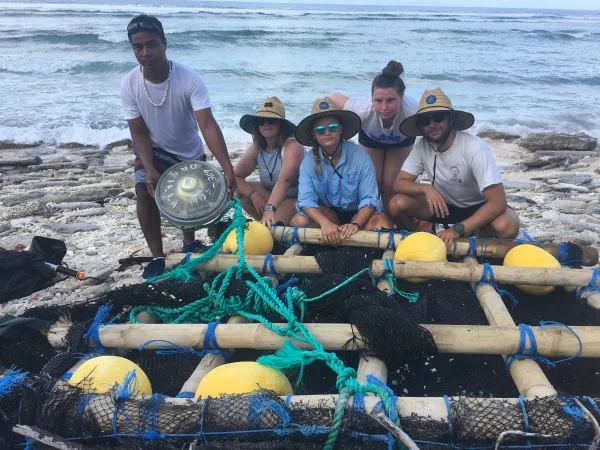Programs Blog
One month at sea

Delaney Swann, C Watch, Boston University
Ship’s Log
Current Position
4˚ 54.0’S 173˚ 9.0’W (?)
Ship’s Heading and Speed
165˚T, 6kn
Sail Plan
Motor Sailing under the Stays’ls
Weather
BRIGHT and SUNNY
It’s hard to believe an entire month has passed since the students of S- 287 landed in Pago Pago and boarded the ship that is now our home for the first time. It’s even crazier to think about coming ashore in just 8 days, and being a world away from these islands, which are some of the most beautiful and amazing places in the world.
Yesterday, we got underway after spending three days drifting alongside Nikamaroro, one of the islands in PIPA. But before we cleared the deck and set the sails, my comrades in policy (Silas, Cassidy, Patricia, Brandon and Henry B.), Sophie, Jason, our i-Kiribati observer and friend Miita, and morale officer Jordan, took part in perhaps the greatest educational experience occurring on this boat: circumnavigating the island in search of FADs.
What’s an FAD you ask? FAD stands for Fish Aggregating Device. Open-ocean fish will gather in massive numbers underneath floating surface objects. This is because small and juvenile fish seek shade and shelter underneath the floating object, and then each level of the food chain gathers to feed. Animals such as sharks and turtles are found swimming in the outer layers of a floating object’s community. FADs are a tool for fishing which takes advantage of this behavior. A raft is attached to a GPS beacon, and set to float through the water. FADs are used by purse seine fishers, and are extremely effective at gathering both target species and bycatch. So effective, that the use of FADs threatens vulnerable bycatch species and puts a lot of pressure on highly prized target species, such as tuna.
FADs were a replacement for a fishing technique where purse seine fishers would enclose a net around hunting dolphins, effectively killing entire pods. While FADs have less dolphin casualties, purse seine fishers still make sustainable ocean resource management super difficult, and management of FADs is even more difficult. Some fishers will float their FADs through protected areas, such as the Phoenix Islands, and collect the gathered fish on the other side, which undermines the entire purpose of the Marine Protected Area’s extractive activities ban. However, it’s difficult to know which fishers are sending their FADs through purposefully, and which have FADs that just happen to float through the area, adding another layer of difficulty to the already monstrous task of enforcing conservation law in millions of kilometers of protected ocean.
Yesterday, we counted the FADs on the island, which is a new SEA tradition, and likely some of the only data being collected about FADs in PIPA. Gathering data like this could end up being useful for understanding policy around FADs and how they threaten marine species, and it is super exciting that we were able to be a part of it. I’m not sure how many of our party were actually prepared to walk 10 miles scrambling on pieces of coral and walking through sand (none of us) (Yes, I absolutely got Swanned in the Pacific ocean), but finding the 16 FADs was hands on policy experience like no other.
Before we headed back to the cut in the coral – the only place on the island where we can get picked up and dropped off by the small inflatable boats we use during island excursions – Miita climbed a 25 foot coconut tree, and dropped 12 coconuts to the ground. Silas used the ship’s machete to chop off their tops and we each drank the sweet refreshing water from the coconuts as we recovered in the shade, looking out into the distance at the ship, and the ever present meeting of the ocean and the sky.
I am so glad to have met, to know, and to have lived with these amazing people, in this amazing place. I have refreshed love for the ocean, and new love for the Pacific. That being said I have missed my family and friends so much. I can’t wait to live and laugh with Karlena, to see Angela and Emerson before they head to Italy, and to sit on the porch of Mojo Burrito with Bennett, Ben, and Isabella. I have missed Ellie so much it hurts, and I am so looking forward to the week I’ll get to spend with her and my parents. I hope things are good. Give love to the dogs and cats. I’m not ready to get off this boat yet, but I’m going to be so excited to see you
when I am.
– Delaney Swann, C Watch, Boston University
Recent Posts from the Ships
- Ocean Classroom 2024-A collaborative high school program with Proctor Academy
- Collaborations and Long-term Commitments: SEA’s Caribbean Reef Program Sets a Course for Coastal Programs that Compliment Shipboard Experiences.
- Sea Education Association students prepare for life underway using state of the art nautical simulation from Wartsila Corporation.
- SEA Writer 2022, Magazines From the Summer SEA Quest Students
- Technology@SEA: Upgrades Allow Insight into Ocean Depths
Programs
- Gap Year
- Ocean Exploration
- High School
- Science at SEA
- SEA Expedition
- SEAScape
- Pre-College
- Proctor Ocean Classroom
- Protecting the Phoenix Islands
- SPICE
- Stanford@SEA
- Undergraduate
- Climate and Society
- Climate Change and Coastal Resilience
- Coral Reef Conservation
- Marine Biodiversity and Conservation
- MBL
- Ocean Exploration: Plastics
- Ocean Policy: Marine Protected Areas
- Oceans and Climate
- Pacific Reef Expedition
- The Global Ocean: Hawai'i
- The Global Ocean: New Zealand